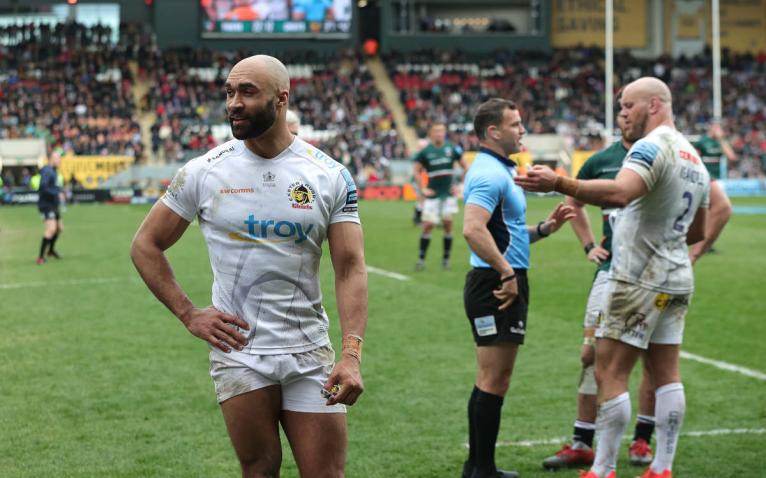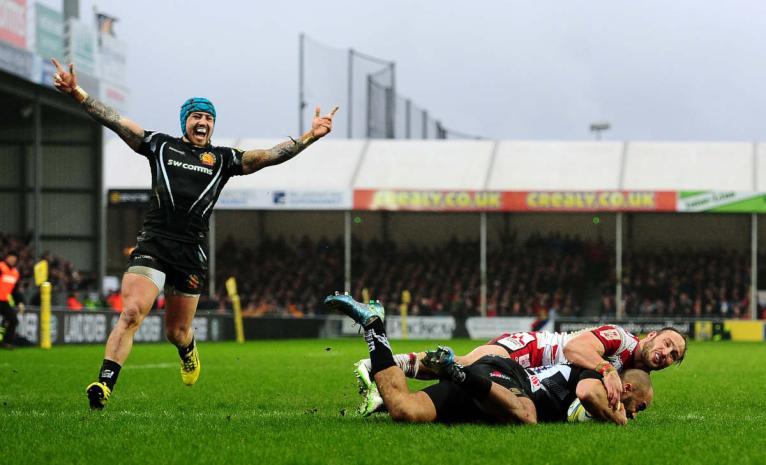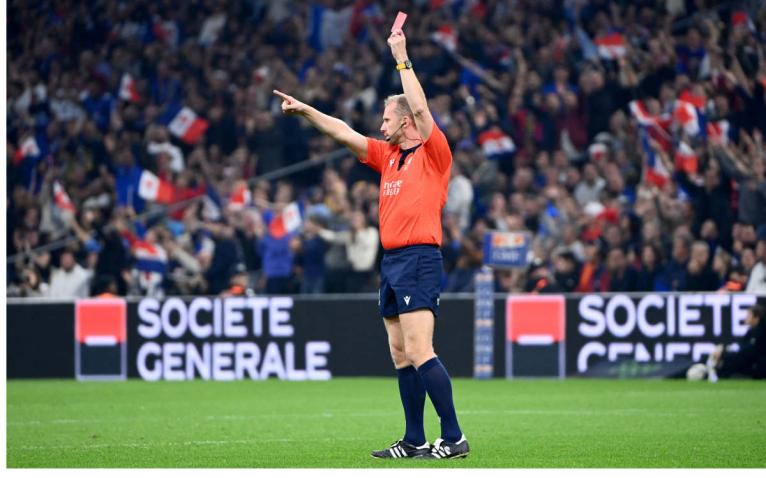Jack Nowell is one of rugby’s most authentic characters. The type of man who can raise a smile, dressed in Munster colours, pint in hand, when his beloved Exeter Chiefs are going toe-to-toe with the Irish province for his own stag-do at Thomond Park. The type of relatable rugby player who, were it not for his abundant talent, would have been likely knocking round the rugby clubs of Cornwall having a laugh with mates.
Nowell is an everyman, a Jack-the-lad. He was rocking a mullet before they became cool and is inked up as an expression of his personality and not for performative reasons to gain more attention.
Indeed, as the son of a trawlerman, authenticity is woven into his DNA.
On Sunday, entirely in character, he threw his support behind his team-mate Olly Woodburn, who was sent-off for a second yellow-card in a fruitless attempt to stop Chris Ashton from scoring. He was adjudged by the TMO to have dropped illegally onto Ashton as the former England wing was being tackled by Stuart Hogg, and by the rules of the game, Karl Dickson was correct to send the Chiefs winger for an early bath. However, as was soon apparent, the majority of rugby fans saw the decision as nonsensical and set social media alight, railing against the idiocy of the ruling.
Nowell reached for his phone and tweeted, “I’m actually in shock, like shock shocked. What the hell is happening? That’s one of the worst decisions I’ve ever seen. EVER.”
It didn’t take Hercule Poirot to surmise that he was venting his ire towards a match official, and he was summarily followed by the Devonian brotherhood, Henry Slade and Luke Cowan-Dickie, who were similarly perplexed, and let’s face it, incenced.

With a seismic Heineken Cup quarter-final coming up against La Rochelle in 10 days time, Rob Baxter would very much like to have his 46-cap England wing tasked with keeping Teddy Thomas in his back pocket, but instead, he will be sweating because Nowell will be donning his sharpest (and probably only) suit to a disciplinary this evening over said tweet – even though he deleted it hours later, when he had calmed down, or more likely a confidant urged him take it down in case it landed him in hot water. The club have subsequently said they will stand squarely behind him.
Of course, any attempts at disguising his rush of blood to the head was doomed and his emotionally charged missive was duly noted in TW2.
In due course, the RFU charged him with ‘conduct prejudicial to the interests of the Union and the game under RFU rule 5.12 for tweeted criticism of the referee’s decision to his 61,000 plus followers’.
Little more than a decade ago, watching rugby on a sofa or a pub, rugby fans could throw their hands up in exasperation at a refereeing decision they disagreed with, swear at the TV, but by and large, forget about it as play moved on
Since the disciplinary was announced, the court of popular opinion, on Twitter, for what it’s worth, has largely backed Nowell’s fit of pique and declared him ‘not guilty’, over his show of support for his crestfallen comrade. Freedom of speech, your honour, his supporters have cried in unison.
Of course, Nowell has a point, it was a curious decision that befuddled those watching unaware of rugby’s often baffling laws, and rugby doesn’t want to muzzle one of its most credible personalities, but it is also true that we don’t want a social media free-for-all against our referees becoming the accepted norm.
Little more than a decade ago, watching rugby on a sofa or a pub, rugby fans could throw their hands up in exasperation at a refereeing decision they disagreed with, swear at the TV, but by and large, forget about it as play moved on.
For the more measured fan, there was a feeling that decisions would level out over the season, but not now. Now there is a platform to communicate instantly, and emotively what you’re feeling and it’s not covering rugby in a glow of soothing, feelgood vibes. Quite the opposite. When the opprobrium rains down on the individual employed to uphold and underpins the game’s rules and values, it takes a more sinister turn.

It seems that every rugby supporter backs the sanctity of the referee, operating in what is a fiendishly difficult sport to officiate, unless it’s their side. In recent weeks, Twitter has been unrelenting in its criticism of the game’s officials and perceived biases against individuals, countries and club crests. Some of these ardent critics need to remember that without a referee, we have no game. When this writer spoke to Nigel Owens, the affable West Walian took an educated guess that he would make around 240 decisions during a Test match. That’s one every 20 seconds. Such was the intensity of his 100-Test career that he admitted that the next day would be a near write-off while he recovered physically and mentally.
It seems every time a referee opens up and says they have been subjected to dog’s abuse online, there is a short period of reflection and navel-gazing
Surely there needs to be an acceptance that rugby is a perfectly imperfect game. If we are to finish the game before the metaphorical cows come home, and speed up proceedings, some complex 50-50 decisions will have to waived. Clearly, rugby’s authorities should remain vigilant in how to improve the product both in the balance of fairness and as a spectacle, but I understand the RFU has to be seen to uphold standards and point out what is expected of its high-profile players who wield ever increasing influence over the game’s more malleable minds.
It seems every time a referee opens up and says they have been subjected to dog’s abuse online, there is a short period of reflection and navel-gazing, but this flimsy online truce ends as soon as the whistle blows and the armchair critics and gung-ho keyboard warriors threaten hell and damnation on their chosen subject. Was it only a matter of months ago that Wayne Barnes and his family were subjected to death threats after his officiating of the France v South Africa game? Barnes, a respected barrister was so upset, he considered hanging up his whistle, before calling for a representative body to be set-up to protect referees.

Barnes is only the latest in a long line of referees who have been abused online, which includes Andrew Brace, Ben O’Keeffe, Craig Joubert, Jaco Peyper, Steve Walsh and Luke Pearce. Many have said it has deeply affected their mental health and many have thought about leaving the game altogether. Do their critics think they could do a better job? For those who answer in the affirmative, please step forward with your CVs. As a coach at U16 level, there have been numerous occasions over the years where a referee’s decision has been critiqued in a less than polite manner, and high-profile players need to understand they are role models, because their actions permeate into the community game.
Upholding standards is to be commended because criticism of referees is a slippery slope and is in danger of getting out of control
Is there an easy answer? Of course not, the social media genie is out of the bottle and there’s no turning back. We want fans to care about the game, to act as its custodians and express their opinions but maybe rugby’s influencers should think twice about airing their views on a social forum with a rabid, and sometimes anonymous set of trolls looking do their utmost to unsettle the very individuals employed to promote fair play.
To be clear, Nowell’s outburst was not littered with profanities, nor did it encourage abuse of match-officials. It was from the heart and done during a game he would love to have been involved in, with adrenalin coursing through his body, but correspondingly setting an example, and upholding standards is to be commended because criticism of referees is a slippery slope and in danger of getting out of control. You would hope a fair decision is found and lessons learned.


'It has no actual relevance to a scoring situation'. There is nothing to say that the law in question doesn't apply in the act of scoring so, rightly or wrongly, it's entirely relevant.
The entire issue of criticism of referees stems from two things.
Firstly it’s the lack of accountability. World Rugby never comes out to explain anything.
Pascal Gauzere took an absolute hammering in the media and online for the decisions he made during the Wales v England 2021 six nations match. Yet the only actual form of accountability we saw was a leak that said he admitted he got it wrong when he spoke to the head of referring. The failure come out and say he was right or wrong isn’t helpful. He leaves referees to take the abuse instead of drawing a line under it.
Karl Dickson may of applied the law correctly but no one has explained the law itself or it’s intended purpose and what the defined application should be. Yet the decision he made to give a penalty try is different to the decision he made earlier in the season when André Esterhuizen did the same thing. It was a penalty but not a penalty try.
The second issue is that the rules of the game and the way they are applied is far too inconsistent. Karl Dickson applied a law of the game which was never intended to be factored into a try no try conversation. It was purely meant to stop players diving on players once the tackle is complete. It has no actual relevance to a scoring situation.
The outcome of the decision was once again different and the question had to be raise would a Wayne Barnes or a Craig Joubert have come the odds are probably not but neither would of both of those referees come to the same decision.
Fundamentally the problem stems from both a lack of accountability, inconsistency in decisions and rules that are rarely reviewed in a way that see them properly applied in a game before being signed off.